 |
|
|
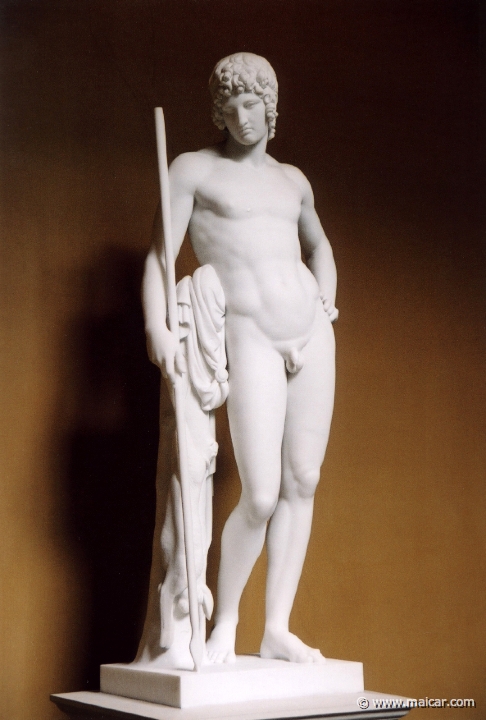
|
Adonis. 9125: Statue by B. T. Thorvaldsen, 1770-1844. Neue Pinakotek, München.
|
|
Adonis was a handsome young man, of beauty comparable to that of Endymion, Ganymedes, Narcissus, Hyacinthus 1, Atlantius (also called Hermaphroditus), Hylas or Chrysippus 2.
Born from a tree
Adonis' mother Smyrna conceived an incestuous passion for her father, and with the complicity of her nurse shared the bed of her father (Cinyras 1 according to some or Thias according to others). When he learned that he had been deceived by his daughter, he pursued her with a sword and, being overtaken, she prayed to the gods that she might be invisible; so the gods in compassion turned her into the tree called smyrna (myrrh). Ten months afterwards the tree burst and Adonis was born. Some say:
"A new tree was not worth so great a price." (Ovid, Metamorphoses 10.310).
But Smyrna's thought had been:
"Human civilization has made spiteful laws, and what nature allows, the jealous laws forbid." (Ovid, Metamorphoses 10.329).
It is said that because of the different opinions about these love matters, there were in Thebes three different wooden images of Aphrodite. One of them they called Urania (Heavenly), and it signified a clean love free from bodily lust. Another one was called Pandemos (Common), and it denoted simple sexual intercourse. And the third was called Apostrophia (Rejecter), meaning that mankind should reject this kind of passions and acts.
Love sessions
All this was possible because Smyrna's mother Cenchreis (though some say Orithyia 3) was busy celebrating the annual festival of Demeter, along with other married women. Smyrna, some say, attempted to commit suicide to avoid becoming the incestuous lover of her own father, but she was discovered by her nurse (Hippolyte 6, according to Lib.Met.34.10) before she was able to take her life, and this nurse promised her to help her. So one dark night, when the nurse noticed that the king was drunk with wine, she told him of one who loved him truly, and later she guided Smyrna to her father's bedroom. The scene repeated several nights until the king became curious concerning the identity of the young girl.
Birth of Adonis
Some say that she wandered in several countries until she prayed to the gods to be refused both life and death and, as they listened, they changed her into the tree known as myrrh. That is why she is also called Myrrha. In time the tree cracked open and Adonis was born.
|
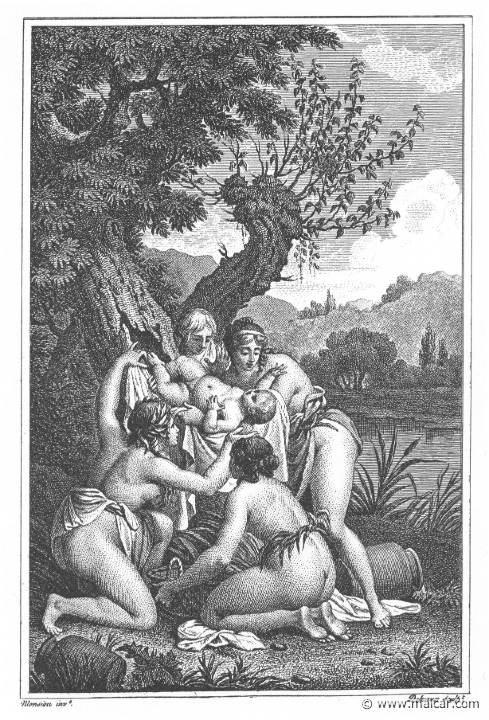
|
02073: Birth of Adonis. "Pitying Lucina stood near the groaning branches, laid her hand on them, and uttered charms to aid the birth." (Ov. Met. 10.510). Guillaume T. de Villenave, Les Métamorphoses d'Ovide (Paris, Didot 1806–07). Engravings after originals by Jean-Jacques François Le Barbier (1739–1826), Nicolas André Monsiau (1754–1837), and Jean-Michel Moreau (1741–1814).
|
|
Loved by goddesses
When Adonis was still an infant, Aphrodite, for the sake of his beauty, hid him in a chest unknown to the gods and entrusted it to Persephone. But when Persephone beheld him, she would not give him back. The case being tried before Zeus, the year was divided into three parts, so that Adonis should stay by himself for one part of the year, with Persephone for one part, and with Aphrodite for the remainder. However Adonis made over to Aphrodite his own share in addition. For this reason Adonis may be counted among those who were in the Underworld and came back to be among the living. Others say that Zeus appointed the Muse Calliope as judge of this dispute, and that the way in which she administrated her office led to the death of Orpheus. For Calliope decided that each of the goddesses should possess him half of the year, but Aphrodite, disliking this verdict, which she felt robbed her of her right, stirred the Thracian women against Orpheus, son of Calliope, who tore him limb from limb. Aphrodite and Adonis spent many hours together, as lovers do, hunting and telling tales. Aphrodite also told Adonis not to hunt wild beasts but to hunt only those which are safe to hunt, like hares, stags or does.
Death of Adonis
|
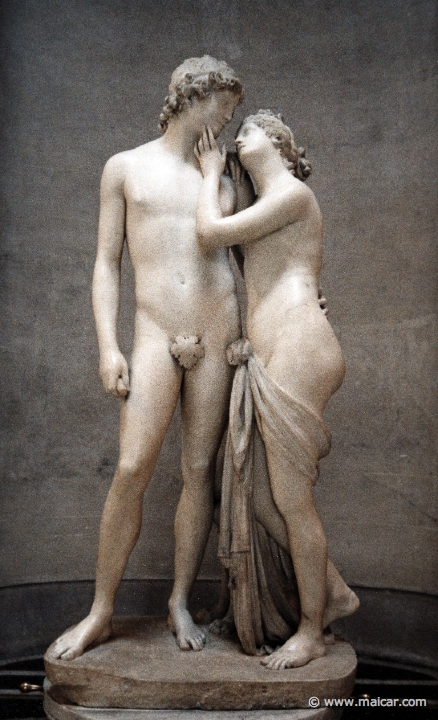
|
5633: Antonio Canova 1757-1822: Vénus et Adonis 1789-1794. Musée d'Art et d'Histoire, Genève.
|
|
But Adonis met a boar and attacked it, and the boar fought him back, wounding him. Adonis died in Aphrodite's arms, who came to him, having heard his groans. When he died she sprinkled the blood with nectar and the short-lived anemone, which takes its name from the wind which so easily makes it fall, was produced. After their daughter, Beroe 5, the city Berytos (Beyrut) in Lebanon was called. Both Dionysus 2 and Poseidon fell in love with her. There is also a river Adonis near the city of Byblos.
Still other parentages have been attributed to Adonis: Son of King Agenor of Phoenicia; son of Thias and Aoa; son of Zeus (without intercourse with any female).
Roscher, Lex. 1.69.44.
According to some, Adonis was born from the tree into which Smyrna had transformed either when his father clove it with his sword, or when a boar opened it with his tusks.
Roscher, Lex. 1.70.49, 1.71.15.
Adonis died of a wound in his knee caused by a boar. Some have said that this boar was sent by Ares, who was jealous, or that the boar was Ares himself. According to Apollodorus 3.14.4, it was the anger of Artemis that caused Adonis' death. Still others say that Apollo turned himself into a boar and killed Adonis to avenge his son Erymanthus (only known for this), whom Aphrodite had blinded for having seen her while she bathed. Adonis died either in Idalium (Cyprus), or in Lebanon.
Roscher, Lex. 1.71.31, 1.71.40, 1.71.51, 1.71.60.
|
| Family |
Parentage (four versions)
|
|
|
|
|
|
|
|
|
|
|
|
|
|
|
|
|
|
Phoenix 1 & Alphesiboea 2
|
|
Cinyras 1 is the founder of the city of Paphos. He reigned in Cyprus and when the Trojan War broke up he swore to send fifty ships against Troy but sent only one. Cinyras 1 is son of Sandocus and Pharnace. Sandocus moved from Syria to Cilicia, which is the southeasternmost coastal region of Asia Minor, and there founded a city Celenderis. Sandocus' grandfather is Astynous 1, son of Phaethon 1 and Aphrodite. Pharnace is daughter of King Megassares of Hyria in Boeotia.
Others have said that Cinyras 1's mother was Paphos, daughter of Pygmalion 1.
Smyrna is daughter either of Cinyras 1 and Cenchreis, or of Thias and Orithyia 3. Cenchreis used to boast that her daughter Smyrna excelled Aphrodite in beauty.
Metharme is one of the two daughters of Pygmalion 1.
Thias, like his father Belus 2, was king of Assyria. He married the Nymph Orithyia 2, and when he learned that he was a incestuous father he committed suicide.
Phoenix 1 is better known for being called brother of Europa. His wife, who is not his daughter, is otherwise unknown.
|
|

Aphrodite
|
|
Beroe 5, some say, is one of the OCEANIDS, in which case she would be the daughter of Oceanus & Tethys. But others have said that she is the daughter of Adonis & Aphrodite and that the city of Berytos, which is Beyrut in the country today called Lebanon, was named after her. It has also been said that Poseidon won her hand fighting against Dionysus 2.
|
|
|
|
|
|
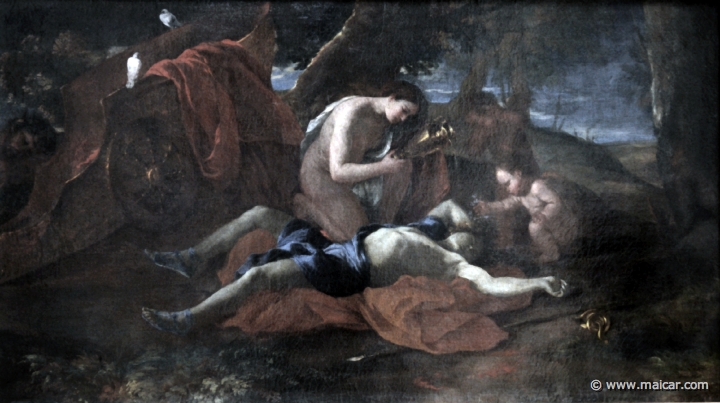
|
4601: Death of Adonis. Nicolas Poussin 1591-1665: Vénus pleurant Adonis. Musée des beaux arts, Caen.
|
|
|
|
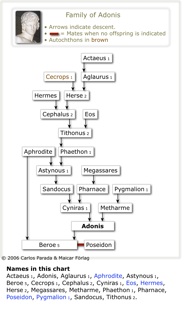
|
Genealogical Charts
Names in this chart: Actaeus 1, Adonis, Aglaurus 1, Aphrodite, Astynous 1, Beroe 5, Cecrops 1, Cephalus 2, Cyniras 1, Eos, Hermes, Herse 2, Megassares, Metharme, Phaethon 1, Pharnace, Poseidon, Pygmalion 1, Sandocus, Tithonus 2.
|
|
|